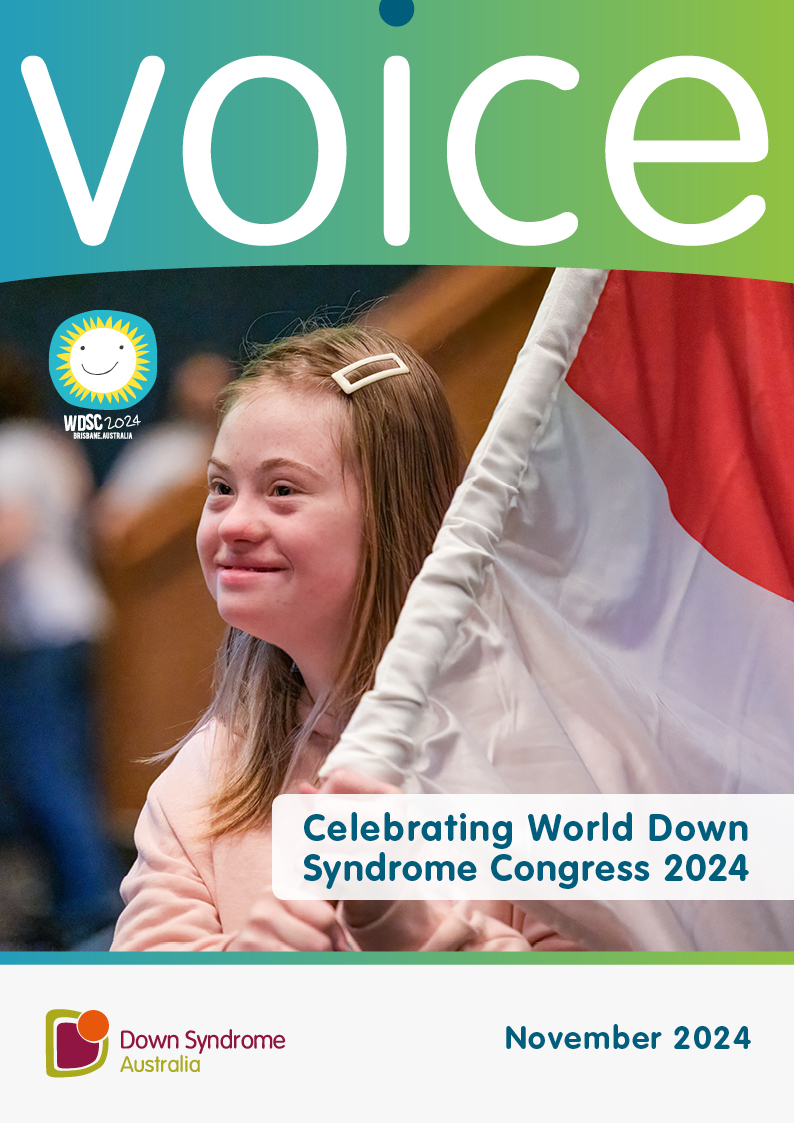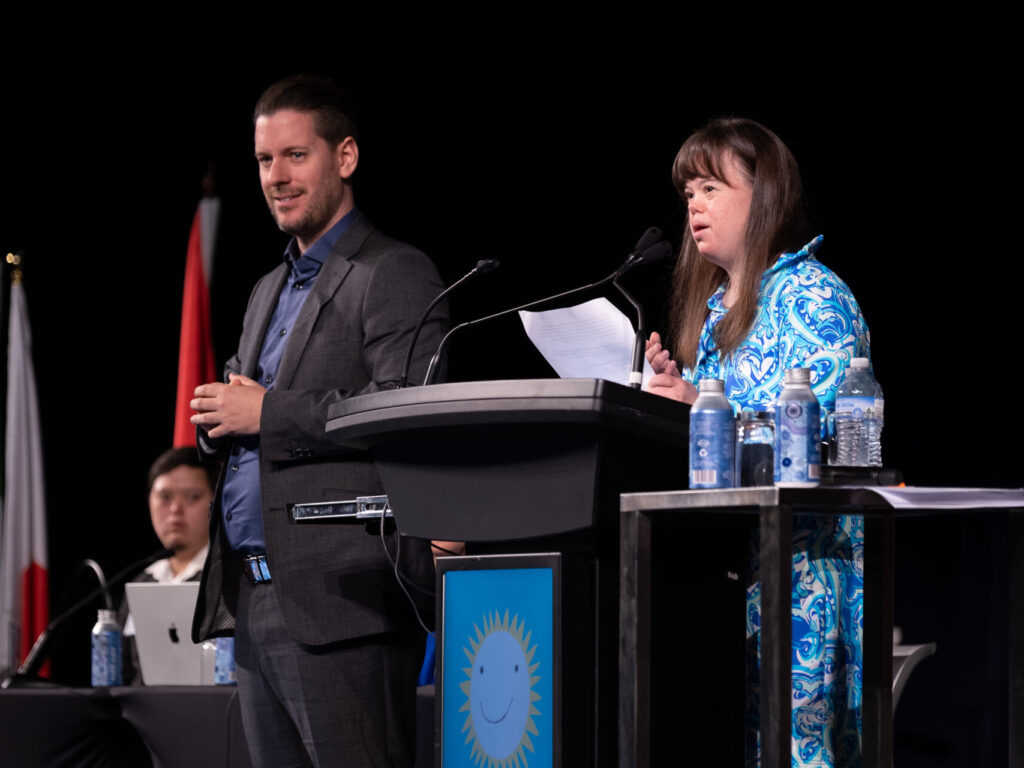Adventures in advocacy, with my heart leading the way
During Congress, we sat down with a number of extraordinary humans to hear their stories and ask questions about their advocacy. Charlotte Woodward was one such guest. She is an American sociologist who presented at Congress on her experiences undergoing heart surgery and advocating to prevent transplant discrimination for people with disabilities. Here is some of what Charlotte shared with us.
To read the full digital issue of Voice, download a copy here.
All of us in all our wonderful diversity can make the world a better place—not just for those of us with Down syndrome, but for everyone.
I like to think that it’s my heart that has helped lead me through life, with a desire to promote inclusion, acceptance and advancement for people with Down syndrome.
Although we may live many, many miles apart, in many different parts of the world, there are things we all share and have in common. We all have hopes and dreams and desires. We all want to feel we belong, and we all want to be included.
When I was born and they told my mum that I had Down syndrome, she did not know what that meant. She had never encountered anyone with Down syndrome before. Today, there is much more inclusion, but still not nearly enough. Many people have never met or interacted with a person with Down syndrome, so stereotypes persist.
I consider my mission to dispel those stereotypes and to invite others to meet and include people with Down syndrome and other disabilities in all walks of life. We should all try within our hearts to see the essential humanity and inherent value and worth of others. If together we do that, the world will be a better place for all of us.
Within minutes of my birth, doctors told my mum I would likely never learn to read or write and that when I was older I would probably end up working in a sheltered workshop. If only those doctors could see me today! Thankfully, my mum did not take the doctor’s words to heart. She became determined to do her very, very best to help me learn as much as I could, which has resulted in me becoming a lifelong learner.
I learned to read and write at a very young age. I might add, in fact, reading and learning are my very favourite things to do. I hope to have some of my original stories published one day. In the meantime, I am the first person with Down syndrome in the United States to have an article published in a medical journal. I have also co-authored several other articles in medical journals. I have written other articles about Down syndrome and disability that have been published as well.
I have been a successful student in preschool, elementary school and middle school, and have been included in general education all those years.
After graduating high school, I became involved in my local Down syndrome advocacy group and later joined its board of directors. Through this group I met members of the National Down Syndrome Society (NDSS) and was encouraged to apply for a job there. I was initially hired as the community outreach associate and worked with another amazing colleague who are here at Congress. For the past two years I have worked as an education programme associate.
I love my career with NDSS. I just learned that when I return from Australia, I’ll transition to the position of programme associate. It means I will become even more involved in policy and advocacy, health and wellness, community engagement and employment- related issues.
At university I pursued a degree in sociology, which is the study of social life. I believe that majoring in sociology would help me to work towards structural and systemic change, including the passing of legislation that will benefit those with Down syndrome. I had to write a research proposal for a potential research study. It was titled In Their Own Words, and explored identity in a Down Syndrome community.
I was born with a significant heart condition which would require surgery to correct. Had I been born prior to the late 1980s, doctors may have refused to provide lifesaving surgery due to my Down syndrome diagnosis, which was sadly common in the United States. I am very thankful that medical care was an opportunity. I ended up needing four open heart surgeries: three as a baby and one when I was 10.
As I grew, my heart struggled to support my body. As the struggle worsened, my cardiologist determined that I needed a heart transplant and if I didn’t, I would die. Fortunately, my transplant team considered me a candidate for this lifesaving procedure and on January 30th, 2000, I was given a very, very healthy new heart. I’m so very, very grateful for the generosity of my heart donor and her family, and for the willingness of my medical team to give this lifesaving gift.
Too often people with disabilities are denied lifesaving transplants because of institutional bias and prejudice in the medical field against people with intellectual and developmental disabilities.
As I learned more about this issue, I began to work hard towards ensuring that right for everyone with Down syndrome and other intellectual and developmental disabilities. The result is a federal bill called The Charlotte Woodward Organ Transplant Discrimination Prevention Act, which “expressly prohibits healthcare providers and other entities involved in matching donated organs with recipients from denying or restricting an individual’s access to organ transplants solely on the basis of the individual’s disability, except in limited circumstances.”
The congressional committee has voted in favour of this bill, and the next step will hopefully be approval by the House of Representatives before being sent to the Senate and signed into law.
Those of us who are born with Down syndrome want to have the chance to become involved, caring and contributing members of society. Our family, friends and allies already know the enormous positive impact we make on the world. We urge the world to accept us for who we are and to welcome the many contributions we make.
I’m still very grateful for the passion within my heart that has led me to a life of advocacy and adventure.
I’d like to encourage all of you to act fiercely. People with disabilities, including those who Down syndrome, have the right to be proud of who they are, to be treated with dignity and respect, to participate in and to enjoy all that life has to offer and to be included just like anybody else.

Download the full digital edition of Voice here.


0 Comments